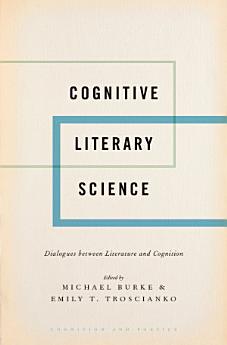Cognitive Literary Science: Dialogues between Literature and Cognition
Michael Burke · Emily T. Troscianko
ડિસે 2016 · Oxford University Press
ઇ-પુસ્તક
304
પેજ
family_home
પાત્ર
info
reportરેટિંગ અને રિવ્યૂ ચકાસેલા નથી વધુ જાણો
આ ઇ-પુસ્તક વિશે
This book brings together researchers with cognitive-scientific and literary backgrounds to present innovative research in all three variations on the possible interactions between literary studies and cognitive science. The tripartite structure of the volume reflects a more ambitious conception of what cognitive approaches to literature are and could be than is usually encountered, and thus aims both to map out and to advance the field. The first section corresponds to what most people think of as "cognitive poetics" or "cognitive literary studies": the study of literature by literary scholars drawing on cognitive-scientific methods, findings, and/or debates to yield insights into literature. The second section demonstrates that literary scholars needn't only make use of cognitive science to study literature, but can also, in a reciprocally interdisciplinary manner, use a cognitively informed perspective on literature to offer benefits back to the cognitive sciences. Finally, the third section, "literature in cognitive science", showcases some of the ways in which literature can be a stimulating object of study and a fertile testing ground for theories and models, not only to literary scholars but also to cognitive scientists, who here engage with some key questions in cognitive literary studies with the benefit of their in-depth scientific knowledge and training.
લેખક વિશે
Michael Burke is Professor of Rhetoric at University College Roosevelt (Utrecht University). He is the author of Literary Reading Cognition and Emotion: An Exploration of the Oceanic Mind (2011). He has published numerous chapters and articles on the topic of cognitive literary science. His areas of interest also include classical rhetoric, stylistics, and pragmatics. Emily T. Troscianko is a Research Associate in the Faculty of Medieval and Modern Languages at the University of Oxford, and in 2014-15 was a Knowledge Exchange Fellow at the Oxford Research Centre in the Humanities, collaborating with Beat, the leading UK eating disorders charity. The book from her doctoral thesis, Kafka's cognitive realism, came out with Routledge in 2014, and she is now working at the intersection of the cognitive and medical humanities, while co-authoring, with Susan Blackmore, the third edition of the psychology textbook Consciousness: An Introduction.
આ ઇ-પુસ્તકને રેટિંગ આપો
તમે શું વિચારો છો અમને જણાવો.
માહિતી વાંચવી
સ્માર્ટફોન અને ટૅબ્લેટ
Android અને iPad/iPhone માટે Google Play Books ઍપ ઇન્સ્ટૉલ કરો. તે તમારા એકાઉન્ટ સાથે ઑટોમૅટિક રીતે સિંક થાય છે અને તમને જ્યાં પણ હો ત્યાં તમને ઑનલાઇન અથવા ઑફલાઇન વાંચવાની મંજૂરી આપે છે.
લૅપટૉપ અને કમ્પ્યુટર
Google Play પર ખરીદેલ ઑડિઓબુકને તમે તમારા કમ્પ્યુટરના વેબ બ્રાઉઝરનો ઉપયોગ કરીને સાંભળી શકો છો.
eReaders અને અન્ય ડિવાઇસ
Kobo ઇ-રીડર જેવા ઇ-ઇંક ડિવાઇસ પર વાંચવા માટે, તમારે ફાઇલને ડાઉનલોડ કરીને તમારા ડિવાઇસ પર ટ્રાન્સફર કરવાની જરૂર પડશે. સપોર્ટેડ ઇ-રીડર પર ફાઇલો ટ્રાન્સ્ફર કરવા માટે સહાયતા કેન્દ્રની વિગતવાર સૂચનાઓ અનુસરો.





